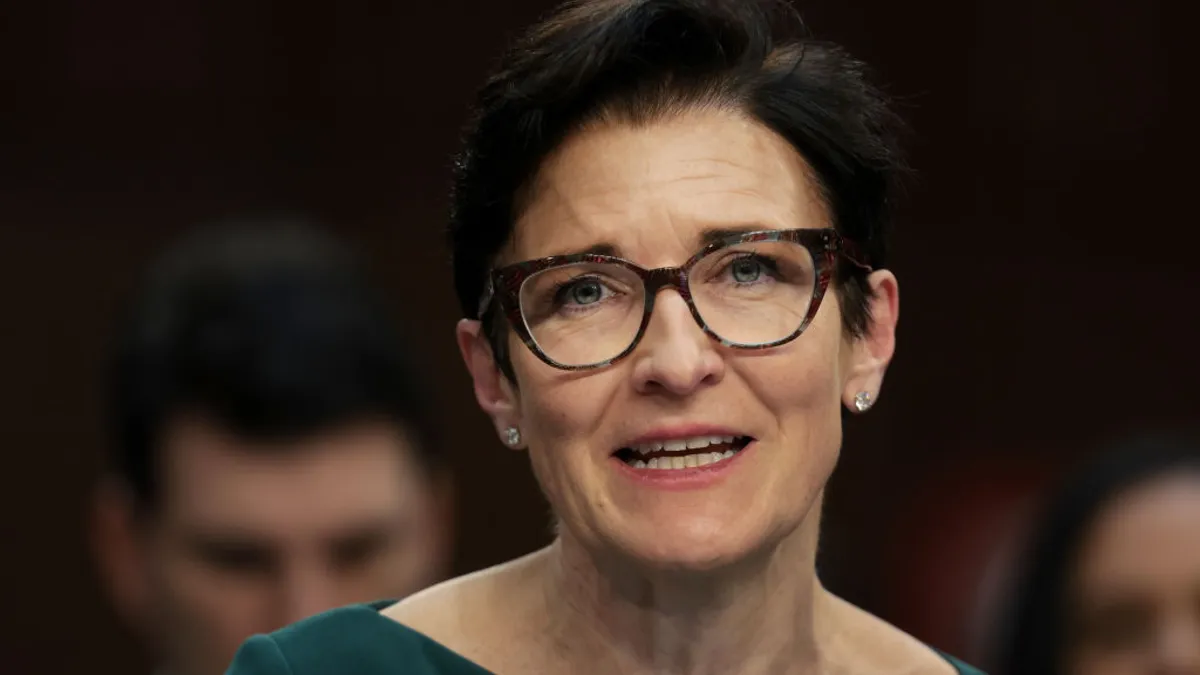Dive Brief:
- Citi CEO Jane Fraser received $34.5 million in compensation in 2024, the bank disclosed Tuesday.
- That’s a 32.7% raise over the $26 million she received in 2023.
- The total catapults her from the lowest-paid CEO of the six largest U.S.-based systemically important financial institutions to fourth, ahead of Morgan Stanley’s Ted Pick, who made $34 million in 2024, and Wells Fargo’s Charlie Scharf, who received $31.2 million.
Dive Insight:
2024 marks the first year in which the chief executives of the six largest U.S. SIFIs each received more than $30 million.
Fraser’s 32.7% pay increase may also be the highest among her peers for 2024. Goldman Sachs CEO David Solomon, by comparison, saw a 25.8% raise to get to $39 million in 2024. JPMorgan Chase CEO Jamie Dimon received an 8.3% pay boost to reach the same $39 million total. Bank of America CEO Brian Moynihan saw a 21% pay increase to reach $35 million. Scharf, of Wells Fargo, received the slightest pay raise, at 7.6%.
The only competition Fraser would have for biggest pay boost is Pick. But that depends on which compensation is counted. Pick received more than $44 million in 2023, but $20 million of that stems from a one-time bonus Morgan Stanley doled out when he was named CEO. Including that bonus, Pick’s 2024 pay represents a 22.8% decrease from the year before. Not counting it, his 2024 pay saw a 41.7% jump.
Fraser’s pay, meanwhile, breaks down to a $1.5 million base salary, a $4.95 million cash incentive, $11.55 million in deferred stock that vests ratably over four years, and $16.5 million that vests based on Citi’s tangible book value per share over three years and a weighted average return on tangible common equity.
In its filing Tuesday, Citi said Fraser’s pay level reflects the compensation committee’s “belief that [her] strategic and other priorities are sound and that she is executing on them promptly and thoughtfully, with an eye toward enhanced safety and soundness, improved returns and laying the foundation for long-term sustainable growth.”
The bank noted its 37% increase in net income from 2023, as well as a 3% bump in full-year revenue.
Citi also highlighted its ongoing work to modernize its tech infrastructure, saying it “accelerated investments” in that arena and “continued to execute on remediation of issues identified” in 2020 consent orders from the Office of the Comptroller of the Currency and the Federal Reserve. To that end, the regulators issued $135.6 million in new penalties against the bank in 2024. The bank last year did, however, see a 2013 Fed consent order lifted.
Citi also credited Fraser for her role in helming a wide-scale reorganization that has “flattened the management model” and “enhanc[ed] … leadership accountability.” The bank has aimed to reduce its workforce by 20,000 employees by 2026 – and cut 7,000 in the first seven months of that effort, wrapping up “major actions” in April 2024.
Citi also praised Fraser for continued efforts to extricate the bank from 14 international retail markets – most notably, in 2024, Mexico. The bank separated its institutional banking operations in Mexico from Banamex, which covers retail and small- and midsize business banking. That sets up a long-sought initial public offering for Banamex, which Citi has targeted for this year.
In its filing, Citi credited Fraser for success in luring external talent to the bank. Among notable hires in 2024, the bank brought in Vis Raghavan from JPMorgan to oversee Citi’s investment, corporate and commercial banking businesses. Citi also hired former PricewaterhouseCoopers senior partner Tim Ryan to lead the bank’s technology and legacy franchise efforts.







